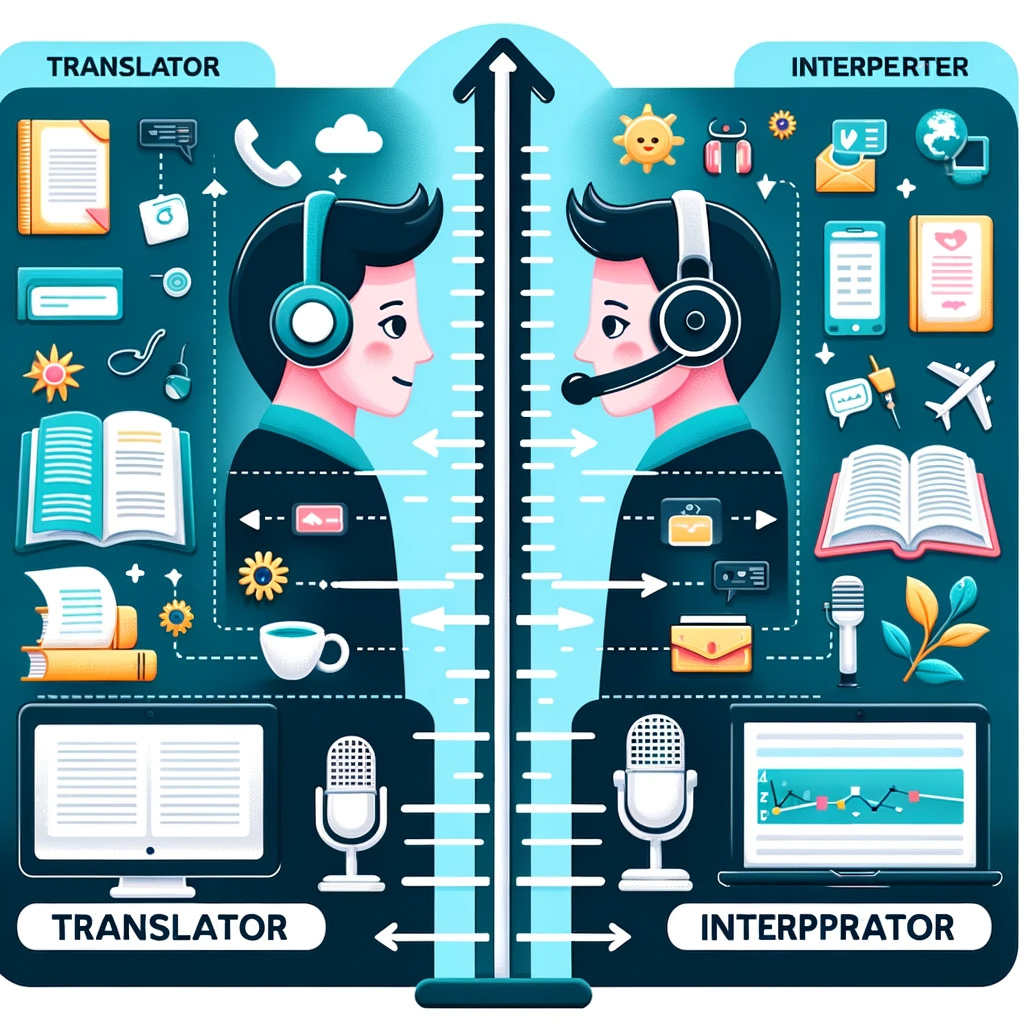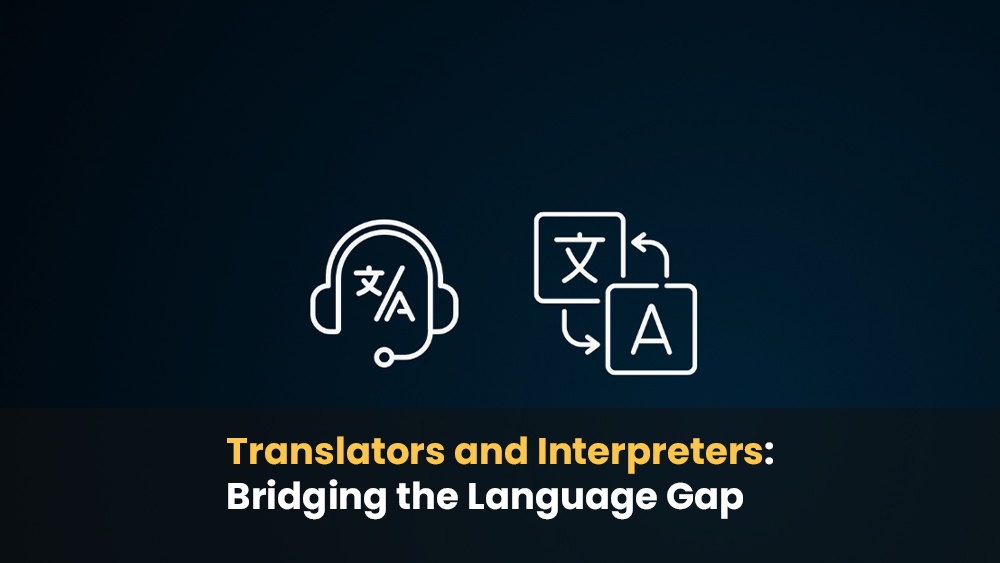In today’s globalised world, the importance of language professionals cannot be overstated. As we become more interconnected and diverse, communication barriers can arise, leading to misunderstandings, missed opportunities, and even conflicts. Language professionals, such as interpreters and translators, play a vital role in facilitating communication between people of different languages, ensuring that information is accurately conveyed and understood. In this article, we will explore the differences between interpreters and translators, the skills required for each, and the importance of understanding these differences when hiring language professionals.
Table of Contents
Defining an Interpreter

What does an Interpreter do?
Interpreters are an indispensable asset in today’s globalised world, where communication between people of different languages is a common occurrence. Interpreters are language professionals who work with spoken language, and their primary role is to facilitate communication between people who speak different languages in real-time.
Where are Interpreters required?
Interpreters can be found in various settings, including business meetings, conferences, legal proceedings, medical appointments, and more.
In business settings, interpreters help companies communicate effectively with their clients or partners by directly translating to the language they understand. Similarly, in conferences, interpreters ensure that speakers’ messages are correctly conveyed to attendees who speak different languages. Interpreters can also play a massive role in legal proceedings, especially those open to the public, where millions of people are given access to a hearing due to the role of an interpreter. Interpreters are also found in the medical field, where they help professionals communicate effectively, ensuring accurate diagnosis and treatment.
One of the most common means of interpretation that is used both on a global and individual level is deaf interpretation. Deaf interpreters play a vital role in facilitating communication between deaf or hard-of-hearing individuals and people who use spoken language. They use their unique skill set to provide culturally appropriate interpretations, ensuring that deaf or hard-of-hearing individuals can access the same opportunities and services as their hearing peers.
With all of this done in real time, interpreters must be highly skilled individuals and adapt quickly to unpredictable language variants.
What skills are required to be a successful interpreter?
Interpreters must have excellent listening skills, as they need to listen carefully to what the speaker is saying and translate it into another language in real time. They must also have excellent speaking skills, as they need to be able to convey the translated message in a way that is clear and easy to understand for the person they are interpreting for. In addition to language proficiency, interpreters must also have a deep understanding of cultural nuances and customs, as these can play a crucial role in effective communication.
Interpreters work in real time, which means that they must be able to work quickly and make decisions on the fly. They must be able to adapt quickly to unexpected situations, such as technical difficulties, changes in the meeting agenda, or cultural misunderstandings. In addition, interpreters must be able to maintain their neutrality and professionalism at all times, even when dealing with sensitive or emotional topics.
What are the different modes of interpretation?
The different modes of interpretation include simultaneous interpretation, consecutive interpretation, and whispered interpretation.
Simultaneous interpretation involves the interpreter translating the speaker’s words as they speak, often using specialised equipment. Consecutive interpretation involves the interpreter waiting for the speaker to finish speaking before translating what was said. Whispered interpretation involves the interpreter whispering the translation to the person who needs it. Interpreters must be able to work on the fly and with little preparation, making quick decisions and adapting to unexpected situations.
Defining a Translator

What does a translator do?
Translators are professionals who specialise in converting written or spoken content from one language to another while maintaining the original meaning of the text. Companies or organisations often employ them to facilitate communication between different language-speaking parties. For example, a business may hire a translator to help them communicate with foreign clients or to translate documents such as contracts, reports, or marketing materials.
What type of documents do translators work with?
Translators work with various documents depending on their specialisation and the industry in which they work. Some common types of documents that translators may work with include:
- Legal documents: Translators may work on legal documents such as contracts, court documents, and patents. These documents require a high level of accuracy and attention to detail.
- Business documents: Business documents such as financial reports, marketing materials, and correspondence may also require translation. These documents often require knowledge of industry-specific terminology and cultural nuances.
- Technical documents: Technical manuals, product specifications, and other technical documents may require translation for international distribution. Translators working on technical documents must have knowledge of specialised terminology and be able to convey technical concepts accurately.
- Medical documents: Translators may work on medical documents such as patient records, clinical trial reports, and medical device manuals. These documents require knowledge of medical terminology and an understanding of the healthcare industry.
- Literary works: Translators may also work on literary works such as books, poems, and plays. Literary translation requires not only fluency in both languages but also an understanding of the cultural context and literary conventions of the original work.
Overall, translators work with a wide range of documents and materials, each of which may require a unique set of skills and knowledge.
What are the skills required to be a successful translator?
Translators must have a strong command of the source and target languages, including their grammar, vocabulary, and idioms. They must also be familiar with the cultural context of both languages, as well as the subject matter of the content being translated. This is particularly important for technical, legal, or medical texts, which may contain specialised terminology that requires a deep understanding of the subject matter.
In addition to their language skills, translators must also be proficient in using translation software and tools such as translation memory systems, which help them maintain consistency and accuracy across multiple translations. They may also use machine translation tools to assist with the translation process, although these tools are not always reliable and must be carefully reviewed and edited by human translators.
What are the different approaches to translation?
There are several different approaches to translation, each of which emphasises a different aspect of the translation process.
Literal translation aims to translate the words of the source text as literally as possible, while free translation focuses on the overall meaning and intent of the text. Cultural translation emphasises the cultural context of the source text, while machine translation uses computer software to translate text automatically. Localisation involves adapting a translation to a specific cultural or linguistic context.
The approach to translation depends on the type of text being translated, the intended audience, and the purpose of the translation. Translators must be able to choose the appropriate approach to ensure that the final translation is accurate, effective, and culturally relevant.
Translator vs Interpreter

What are the educational Paths and Qualifications for Translators and Interpreters?
Translators usually have a bachelor’s degree in translation, linguistics, or a related field. They may also specialise in technical subjects such as law, medicine, or engineering by pursuing a degree in the respective field. Additionally, many translators have experience living or working in a country where their second language is spoken, which helps them to understand the cultural context of the language.
Interpreters may have a degree in interpretation or a related field, although there is no formal education requirement in some cases. They may also specialise in interpreting for specific fields such as law or medicine and gain experience through on-the-job training, volunteering, or internships.
Both translators and interpreters must have a deep understanding of the languages being translated or interpreted, including their grammar, syntax, idioms, and cultural nuances. They must also have strong listening and speaking skills, as well as the ability to work effectively under pressure and in a variety of settings. Practical experience and cultural knowledge are also important for both professions.
What are the different skill sets required for interpreters and translators?
Interpreting and translating require slightly different skill sets due to the different nature of the work involved.
- Language proficiency: Interpreters and translators must be fluent in the languages they are working with, including their grammar, syntax, vocabulary, and idioms.
- Listening and speaking skills: Interpreters must have excellent listening and speaking skills to effectively communicate between two or more parties who may not speak the same language. Translators, on the other hand, must have strong reading and writing skills to translate written documents accurately.
- Cultural knowledge: Both interpreters and translators must have a deep understanding of the cultural context of the languages they are working with, including cultural norms, customs, and idiomatic expressions.
- Specialisation: Both professions may require specialisation in a specific subject matter, such as legal or medical terminology. However, interpreters may require more on-the-spot knowledge and expertise in their specialised fields to interpret effectively in real-time.
- Memory and concentration: Interpreters must have excellent memory and concentration skills to accurately interpret conversations in real-time. Translators, on the other hand, may rely more on technology and reference materials to assist them in translating longer documents.
- Ability to work under pressure: Both interpreters and translators must be able to work effectively under pressure, as they may be required to work in high-stress situations or under tight deadlines.
Overall, interpreters and translators must have excellent language skills, cultural knowledge, and specialisation in their fields to be successful in their respective professions. However, the specific skill set required may differ slightly due to the different nature of interpreting and translating work.
What are the different workflows of interpreters and translators?
Interpreters must prepare for the event they are interpreting for, which may involve researching the topic, reviewing materials, and familiarising themselves with the setting and participants. During the event, interpreters listen to the speaker and interpret what they say in real-time for the other participants. Interpreters may use simultaneous or consecutive interpreting. After the event, interpreters may provide follow-up services, such as written summaries or translations of the interpreted content.
Translators analyse the source text to determine the meaning, context and intended audience before translating it into the target language. They use their language proficiency, cultural knowledge, and specialised subject matter expertise to ensure accuracy, consistency, and clarity. After translating, they edit and proofread their work before delivering the final translation to the client or employer.
Conclusion
In conclusion, the professions of an interpreter and a translator are two unique and distinct fields that require different sets of skills and expertise. Interpreters must be quick on their feet and adept at handling real-time language translation. At the same time, translators must be meticulous and detail-oriented to ensure the translated text is accurate and conveys the intended meaning.
Both professions are crucial in facilitating communication and understanding across different languages and cultures and are in high demand in today’s globalised world. The importance of these professions cannot be underestimated, and their contributions to society are invaluable. As such, individuals who are interested in pursuing a career in either field must possess a genuine passion for languages, a deep understanding of their cultural significance, and a willingness to continually learn and grow in their craft.
Read More
- The Difference Between SLV and MLV in Localization
- From Local to Global: The Journey of Internationalisation
- Unlocking Global Markets with SEO Translation
- Adapt or Fail: Why Localization Strategies Are Vital For Global Success
- The Pandemic’s Impact on Translation Industry
- Navigating Cultural Resonance Through Transcreation
- Successful Strategies for Localizing Mobile Apps
- Navigating Cultural Resonance Through Transcreation
- Audio and Video Translation
- E-learning Translation: Meeting the Demands of the Global Market
- Effective Translations and Localization for Middle Eastern Countries
- Navigating Business and Language Diversity in Iraq
- Celebrating World Arabic Language Day
